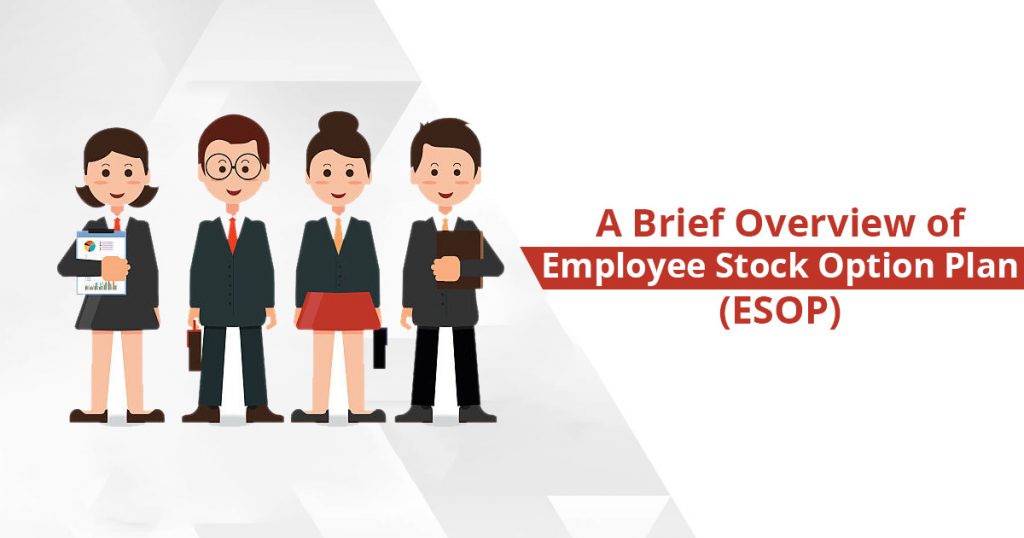Employee Stock Option Plan (ESOP) refers to the employee benefits scheme under which the employees are allowed to purchase the shares of their company. The company encourages the employes to acquire firm ownership by offering the shares at a below-market rate in order to increase their involvement in the scheme. In many cases, the companies in India also offers the stocks as a remuneration up to a specific percentage to employees.
Who is Offered with ESOP and Why It is Given?
Mainly, the employees, who are part of a particular company are offered to opt for the ESOP, but at the same time, some criteria are also decided by the companies to make employees eligible for the same.
So, the key benefits offered under ESOP can be claimed by:
- A permanent employee of a firm, who is entitled to work in or outside India
- A part-time employee or whole director of the company
- An employee of a subsidiary, holding, or associate company, whether residing in India or working from abroad
If we talk about the need for ESOPs, then a multitude of reasons exist. Generally, the start-up businesses in India are found to giving ESOP option to their employees, as they are unable to manage the large compensation of their elite employees. Apart from benefiting the employees, ESOPs are also aimed to align the employed interest with that of shareholders.
The general belief around ESOP is that it increases employees focus towards improving company performance so that the value of their shares also uplift. Some of the employers also give the ESOP to employees with future liquidity option as a means to incentivize them for their long-term commitment.
What is the Working Procedure of ESOP?
The Companies (Share Capital and Debenture) Rules, 2014 in India governs the ESOP in India. As per this Act, the employees are granted with the permission of buying a certain number of stocks in a company by the owners that too at a price below the standard market rate.
From a startup perspective, the general steps followed for offering an ESOP are enlisted below:
- An ESOP scheme is first drafted and submitted to shareholders for approval. Earlier approval for this scheme needs to be obtained by a ‘special resolution’ and filed with the Registrar of Companies, but w.e.f. June 5, 2015, the private limited companies were expected to comply with the practice mentioned above.
- A ‘Letter of Grant’ should be issued to agitated employees after the ESOP scheme draft gets approved in a shareholders meeting. Noteworthy details for share buying are coded in the letter for employees.
- Lastly, the employees after receiving ‘Letter of Grants’ can opt for the ESOP option using the ‘Exercise Application’.
What are the Key Benefits of ESOP?
For Employers
- Ability to buy shares of a departing owner: Private company owners can easily sell their shares in a company through ESOP option. Tax-deductible contributions to the ESOP are allowed to companies to buy out the shares.
- Lend money at a lower after-tax cost: The cash borrowed using the ESOP can also be used by the companies to by other company shares and shares of existing owners. Adding to this, the ESOP contribution by companies are also deductible as they need to repay the loan amount. Both principal and interest are tax deductible.
For Employees
- The employees enjoy greater financial benefits in the form of higher pay, benefits, and wealth generation. It also ensures a comfortable retirement for employees.
- Employees after holding shares in a firm feel more responsible towards their company. Employees also take active participation in company decision-making, which in a way make them optimistic, visionary, and self-organized.
- ESOP also provide better job security and satisfaction to employees owing to the underlying monetary as well as non-monetary benefits.
Tax Implications of ESOP
Taxes are Prevalent in ESOPs at Two Major Instances –
first at the time of exercising and second during the selling of shares.
Employees when exercising the option are taxed as the earned benefits are considered as a prerequisite. Employers also deduct taxes in the first instance of prerequisites whereas at the second instance the price difference between the fair market value of shares and the selling price of shares is known as the capital gains and taxed accordingly.
Some Noteworthy Details about Tax Implications in ESOP Include:
- Vested options by a company to the employees are not taxable.
- If the shares sold by the employees belong to a foreign company than the profit made on the same is termed as short-term capital gains and taxed accordingly.
- The employees who sell their company shares within one year are levied with 15% tax whereas after one year then those shares are considered as long term assets and are not taxable.
Key Terminologies Related to ESOP:
It is essential for the employees to understand the key terminologies that are used under ESOP by employers.
Here are some of the important terms that are frequently used in ESOPs:
- Grant: It refers to the promise made by an employer in relation to the issuance of ‘Letter of Grant’, which informs employees about their eligibility under the ESOP scheme.
- Vesting: This legal term denotes the process by which an employee gets the right to own the shares of a particular company for a specified time duration. Once vesting happens, the benefits of the plan or stock cannot be revoked by a particular employee.
- Exercise: At the initial stage of ESOP, the company grants an option for employees. The process of converting those shares into options by employees is termed ‘exercising’ the option.
